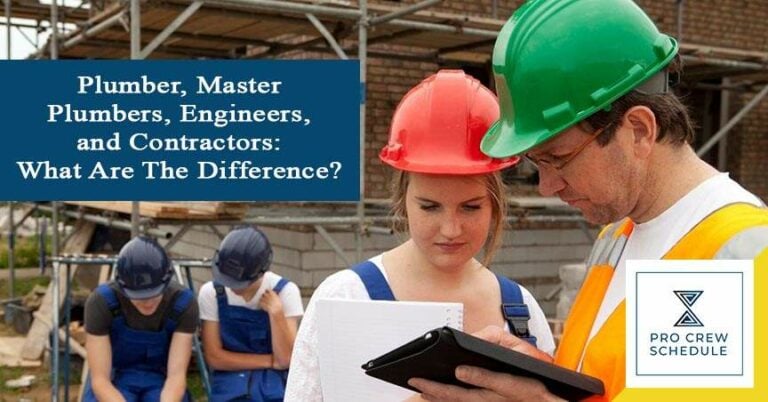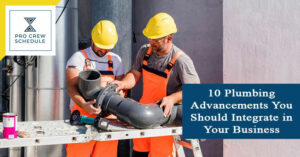Plumbing systems in any structure play a significant role in our daily lives; we certainly feel lost without them. When operations of our plumbing pipes go haywire, our typical first-aid solution is fixing it ourselves, and if it doesn’t work, contact a professional. Suppose you are a contractor with a construction project lined up. In that case, a plumbing expert is also an essential player in the team that should already be appointed in the project’s earlier phases.
Now the question is: what type of plumbing expert should you contact for a specific work?
If you have been in the construction industry for a while, you might have probably heard the term plumber, master plumber, plumbing engineer, and plumbing contractor. While they seem to fall in the same trade in construction, they are very different in terms of responsibilities and requirements to earn the title.
In today’s blog, we will explore the various experts you will encounter in the plumbing world of construction. At the bottom of this article, you will better grasp their roles and what it takes to become one.
What Are the Different Types of Plumbing Works?
Before we differentiate the variety of experts in the plumbing field, let’s first look at the different plumbing areas they work on in this field. Below, we’ll give you a brief introduction to these areas:
a. Water Supply
Among all the types of plumbing work, the most common- broken toilets, clogged pipes, and leaky taps are all water-related problems. Plumbing works involved in this category are the construction, replacement, repair, installation, alteration, testing, maintenance, or commissioning of any water supply service.
b. Stormwater or Roofing
Stormwater is a field that includes any roof flashing or roof covering and any part of a roof drainage system handling the collection and disposal of stormwater, as well as the connection of any stormwater piping to a tank or drain.
c. Drainage
Drainage work involves any part of an underground sanitary drainage system from the above-ground waste or sewage pipes to the disposal system; and any designing job associated with it. Furthermore, stormwater drainage connects the roof downpipes to the main disposal point of the drainage.
d. Sanitary
This system relates to the sanitary system that interconnects all the plumbing fixtures (sinks, showers, toilets, taps, basins) and appliances (washing machine, dishwasher) to the disposal system or underground sanitary drainage line.
e. Mechanical Services
Work involving mechanical heating, ventilation, or cooling systems in a building related to the heating, ventilation, or cooling of that building. This also includes work on boilers, air conditioners, flues, pipes, associated venting or roofing work, etc.
f. Gasfitting
Like water supply, gasfitting is the plumbing works done in any appliance, pipe, apparatus, fitting, valve, or any item involved in the use and supply of gas. This is a specialized field that requires a license to work on any gas repair or maintenance.
g. Fire Protection
Work in plumbing involves any aspect of a water service used for fire protection, from connecting to the water supply to any fire protection device or equipment assembling that service. This involves things like hose reels, fire hydrants, domestic fire sprinkler systems, etc.
h. Irrigation
Plumbing work involving irrigation systems, from the water supply system to the control to any pressurized zone in the overall plumbing system.
Who Are the Different Experts in the Plumbing Trade?
1. Plumber
In construction, plumbers are the most popular as they often deal with small projects such as residential houses. Plumbers are typically the first trade worker that homeowners and building managers or engineer contact for standard plumbing services or when a plumbing emergency arise.
The typical tasks plumbers handle range from unclogging toilets or fixing drains to dealing with burst water pipes. Although these scenarios may seem drastic to the building owners, these are considered minor repairs in the plumbing field.
Plumbers are usually trained in an apprenticeship program under an experienced plumber. They learn how to install plumbing fixtures such as toilets, faucets, sinks, showers, bathtubs, food dispensers, storm drains, built-in water dispensers, and more.
After one goes through this apprenticeship program, that person can now be regarded as a journeyman plumber who can work alone without any supervision. After which, you can submit the necessary applications and fees to the respective licensing agency in your state and pass an initial assessment.
Related: Plumbing Apprenticeship: A Guide For Aspiring Plumbers
2. Master Plumber
Master Plumbers, just like how their title implies, are considered masters when it comes to the art of plumbing. They are highly trained plumbing specialists with years of formal training and experience under their belt.
A master plumber has completed a long series of training and testing to achieve his coveted status and plumbing license.
These specialists are those that you will found setting up complex plumbing systems for factories, major towns, industrial complexes, and commercial buildings. Knowing and a deep understanding of the plumbing code ensure that all plans, specifications, and systems are according to the code. Master Plumbers are considered top specialists in their craft. The works they accept are highly sensitive and critical, requiring exceptional skills and knowledge in plumbing.
The pathway to becoming a master plumber is very challenging due to the degree of dedication, hard work, and time required to get to the end of the road. Most apprentices would often opt for a general plumbing contractor’s license instead of toiling a Master Plumbers License. If journeyman plumbers only require passing assessments and submit documents, Master Plumbers must be:
- Qualified and pass exams,
- Must have ten or more years of practical practice,
- Certified in many plumbing areas, and
- Adhere to additional state requirements.
3. Plumbing Engineer
On the other hand, a Plumbing Engineer is a certified professional engineer specializing in designing plumbing systems in residential, commercial buildings. When a new structure is in its design stages, a Plumbing Engineer is responsible for verifying if every pipe connection is proper and that all hydro-related designs are as efficient as possible.
Since there are different overlapping systems in the building, such as architectural, civil, mechanical, HVAC, and chemical engineering, Plumbing Engineers are the influencers on a building’s energy efficiency, water efficiency, pollution system, and fire protection. Moreover, they are also skilled in overseeing a wide variety of projects, such as:
– Stormwater management system
- Hot and cold-water systems
- A building’s sprinkler system or fire-retardant system in coordination with the fire protection system
- A hospital’s medical gas system
- An entire facility’s drainage and sewer system
In a nutshell, a Plumbing Engineer is not tasked with repairs but with design, implementation, and overall planning and creation of the plumbing labyrinth of a building. Hence, more education and training are involved versus that of a conventional plumber or master plumber. When a qualified Plumbing Engineer oversees a construction project, odds are there won’t be as many maintenance or post-construction issues for that system in the years that will come.
4. Plumbing Contractor
Last and not least, we have the plumbing contractors. A licensed plumbing contractor services are very sought after, and their skills require a long duration of training and experience. The significant difference compared to the other plumbing experts mentioned above is the level and the area of plumbing they work on. Generally, plumbing contractors handle residential and commercial projects. They still do repairs, service, installation, maintenance, and replacement of plumbing systems; moreover, they offer excavation and site work services for new properties or developments.
To become a plumbing contractor, one must obtain a contractor’s license. Typically, licensed plumbing contractors own their own company or business and hire or work with a third-party contractor to handle specialty works in the construction project. State licensing requirements may vary, but most of the time, these include an application fee, passing a particular unit in comprehensive business, law, and building codes subjects.
Key Takeaway
There is the various level of services in the plumbing scene because plumbing work comes in a variety of shapes and sizes. Depending on the needs of a specific community, the plumbing work will usually decide for itself. An industrial factory in the city might look for the work of a master plumber. A residential homeowner may seek a plumber to fix an issue in their house. A general contractor would open a position as a plumbing contractor for his midrise complex building. Or a construction manager working on a commercial structure plumbing system may call the help of a plumbing engineer.
In all schemes of things in the plumbing world, all the roles that we have discussed are essential in delivering and maintaining a successful construction project, even if the parts and areas they touch are diverse from one another. However, all the plumbing experts can benefit from tools and innovations that can ultimately streamline their workflow and processes, no matter how simple or complex they may seem. A tool they can all use in any construction project is reliable scheduling software, such as Pro Crew Schedule, that can help set up the scope of works with realistic timelines of all the plumbing work involved in the operations.







